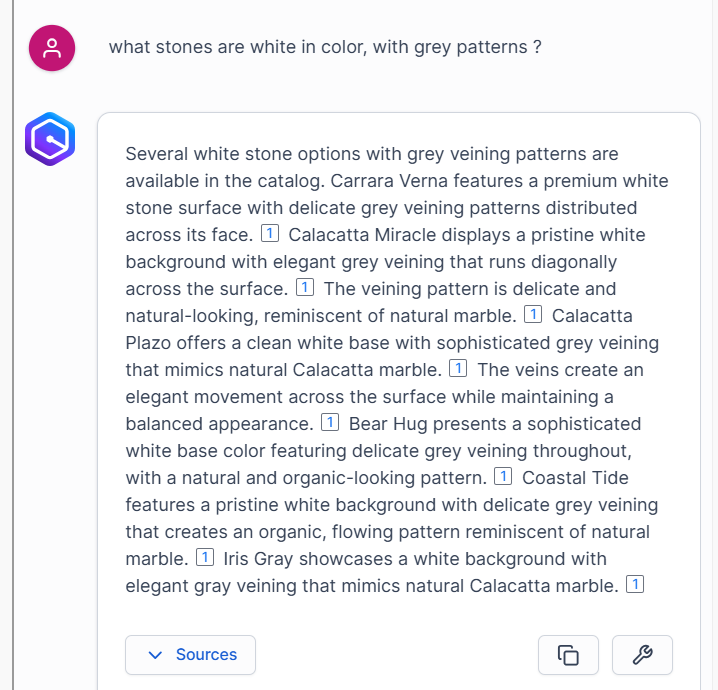
A Chicago-based multinational wholesale distributor of stone products, such as marble, granite, and quartz, maintains catalogs featuring hundreds of images representing their extensive inventory in warehouses across the country. Stone countertops, for instance, are a prized possession and a long-term investment. Consequently, customers frequently have numerous inquiries to ensure they select the most suitable product from the available options.
The illustration below is one such example where a seemingly simple question like “what stones are white in color, with grey patterns?” might take a customer or a sales representative a significant amount of time to scan through a large volume of catalogs with hundreds of pictures of products. An AI-powered language assistant responded to this question in a couple of seconds. That’s an observation based on a pilot being undertaken by the firm.
The application scanned through product catalogs containing hundreds of product images to get answers in seconds with vivid descriptions, something only a tenured sales expert can offer. The catalogs solely included product images, while the descriptions were derived and indexed by GenAI based on insights extracted from those images.
The level of knowledge sales personnel have regarding products and services significantly impacts customer satisfaction. According to HubSpot, the average tenure of a salesperson is 18 months, while reaching peak performance typically takes 2-3 years. It can be challenging for sales teams to remain updated on the various details of product and service offerings that customers inquire about. Responding with “I will check and get back to you” is acceptable, but providing the correct answer immediately can expedite closing a deal.
Traditional methods of training sales teams are often inefficient, as they depend on searching, replaying videos, or reviewing documentation. An AI-powered assistant could provide an alternative. This technology can process a large volume of multi-modal content (documents, images, videos) to quickly answer questions using natural language and serve as a tool for learning reinforcement.
While the solution itself could be built using AI services from any hyperscaler such as AWS, Microsoft, Google, OCI, for this pilot we chose AWS. More specifically Amazon Q Business and Amazon Q Embedded. Amazon Q, is a fully-managed, generative AI powered AI assistant that gives end-users the experience of interacting with a human expert who is knowledgeable about your data. Security permissions and access management were enforced via AWS IAM Identity Center, however, we had the option to use our own IAM Identity Provider. Data sources can be various text documents, audio or video files. They are indexed appropriately based on the type of content, and this data is secure in our private account. Global control settings and guardrails allow application-level controls for controlling the sources the application uses to generate responses—world knowledge and enterprise data, or enterprise data only. For the scope of this pilot and to eliminate hallucinations, we restricted to enterprise data sources and set guardrails to restrict unwanted behavior. Finally, we embedded the AI-powered assistant into the pilot webpage. Ideal next step would be an external use-case, enabling self-service capability for customers. Exciting times !
Comments are closed